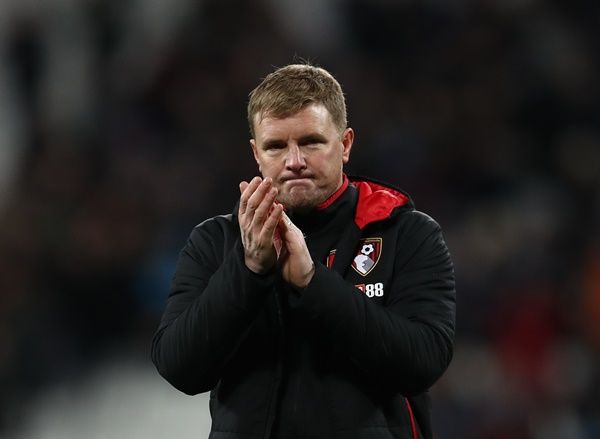

Share
23rd January 2018
05:24pm GMT

 Nine seasons later and Bournemouth are three points from safety in the Premier League, the battle for survivial is seemingly never-ending, but the club are operating in a different world entirely in comparison to their League Two days.
Although Bournemouth were only promoted to the Premier League at the start of the 2015/16 season, they have immediately reaped the rewards of playing in the most lucrative division in world football.
In 2015, the year they were crowned Championship champions, the club had a turnover of £12.9m. The following season, their first year in the Premier League, their turnover increased by £75m to £87.9m.
An extract from the club's accounts published in 2017 reads:
"Turnover was up by £75m to £87m (2015: £12.9m) almost entirely due to the increased revenue generated centrally from being a Premier League club. However, football player and team management wages, including Premier League retention bonuses, also increased as the club strived to offer competitive remuneration packages to attract and maintain the calibre of playing and team management staff necessary to allow the club to compete in the league, with the aim of maintaining Premier League status.
"Other non-exceptional operating expenses increased such as result of higher costs associated with the club playing in the Premier League such as those relating to player loans, player scouting and other stadium and operating expenditure.
"The club recorded an operating profit of £5m (2015: operating loss of £38.1m) which included a gain on disposal of intangible fixed assests in respect of player sales of £10.7m."
Bournemouth attributed the £38.1m loss in 2015 to higher amortisation and depreciation, the financial fair play penalty (a £7.6m fine for exceeding Financial Fair Play limits of permitted maximum losses of £6m for a season with a £10.1m loss in 2014), higher staff costs, which rose to £30.4m, more than double the club's turnover of £12.9m for 2015.
The club said that football wages, including promotion bonuses and paid player signing on fees, were the largest expense for the club, with a 76% increase in total staff costs from the previous year.
Nine seasons later and Bournemouth are three points from safety in the Premier League, the battle for survivial is seemingly never-ending, but the club are operating in a different world entirely in comparison to their League Two days.
Although Bournemouth were only promoted to the Premier League at the start of the 2015/16 season, they have immediately reaped the rewards of playing in the most lucrative division in world football.
In 2015, the year they were crowned Championship champions, the club had a turnover of £12.9m. The following season, their first year in the Premier League, their turnover increased by £75m to £87.9m.
An extract from the club's accounts published in 2017 reads:
"Turnover was up by £75m to £87m (2015: £12.9m) almost entirely due to the increased revenue generated centrally from being a Premier League club. However, football player and team management wages, including Premier League retention bonuses, also increased as the club strived to offer competitive remuneration packages to attract and maintain the calibre of playing and team management staff necessary to allow the club to compete in the league, with the aim of maintaining Premier League status.
"Other non-exceptional operating expenses increased such as result of higher costs associated with the club playing in the Premier League such as those relating to player loans, player scouting and other stadium and operating expenditure.
"The club recorded an operating profit of £5m (2015: operating loss of £38.1m) which included a gain on disposal of intangible fixed assests in respect of player sales of £10.7m."
Bournemouth attributed the £38.1m loss in 2015 to higher amortisation and depreciation, the financial fair play penalty (a £7.6m fine for exceeding Financial Fair Play limits of permitted maximum losses of £6m for a season with a £10.1m loss in 2014), higher staff costs, which rose to £30.4m, more than double the club's turnover of £12.9m for 2015.
The club said that football wages, including promotion bonuses and paid player signing on fees, were the largest expense for the club, with a 76% increase in total staff costs from the previous year.
 Bournemouth signed nine players on free transfers and undisclosed fees in their two seasons in the Championship, with signings including Callum Wilson, Andrew Surman, Dan Gosling and Junior Stanislas, all of whom have played between 11 and 18 games this season.
The key to Bournemouth's rise is clearly their promotion to the Premier League, but their arrival in the top flight of English football accumulated losses of £15.32m, £10.1m and £38.1m in three consecutive seasons before their promotion.
Each year the losses piled, the club said that football wages were their biggest expense. Bournemouth were playing high stakes Poker.
Eddie Howe unquestionably played a gigantic role in steering the club from League Two to the Premier League, but the club were happy to keep taking losses along the way, even when those losses exceeded financial fair play limits.
Clubs like PSG and City have made a mockery of the financial fair play rules over the course of this decade, but clubs like Bournemouth have also bet big in hope of large pay-offs.
In 2013, the clubs turnover was £5.18m. In 2018, Deloitte reported a revenue of £136.8m, making the Cherries one of the richest clubs in world football.
Financial Fair Play sanctions were not a deterrent for Bournemouth but merely a neccessary obstacle. Small infractions were absorbed for a larger pay-off.
Howe has done a magnificent job with his side over the last three seasons and the club are now preparing to transition to a team battling from survival to one of the major financial players in world football.
Bournemouth are planning a new stadium for 2020, they have broken their club transfer record seven times since earning promotion to the Premier League, and their business is booming less than a decade after it nearly went bust.
Saint Jerome wrote in Letter 48 to Pammachius that 'The line, often adopted by strong men in controversy, of justifying the means by the end'. But what did Saint Jerome know about gaining promotion to the Premier League?
Fuck all. The end really does justify the means.
Bournemouth signed nine players on free transfers and undisclosed fees in their two seasons in the Championship, with signings including Callum Wilson, Andrew Surman, Dan Gosling and Junior Stanislas, all of whom have played between 11 and 18 games this season.
The key to Bournemouth's rise is clearly their promotion to the Premier League, but their arrival in the top flight of English football accumulated losses of £15.32m, £10.1m and £38.1m in three consecutive seasons before their promotion.
Each year the losses piled, the club said that football wages were their biggest expense. Bournemouth were playing high stakes Poker.
Eddie Howe unquestionably played a gigantic role in steering the club from League Two to the Premier League, but the club were happy to keep taking losses along the way, even when those losses exceeded financial fair play limits.
Clubs like PSG and City have made a mockery of the financial fair play rules over the course of this decade, but clubs like Bournemouth have also bet big in hope of large pay-offs.
In 2013, the clubs turnover was £5.18m. In 2018, Deloitte reported a revenue of £136.8m, making the Cherries one of the richest clubs in world football.
Financial Fair Play sanctions were not a deterrent for Bournemouth but merely a neccessary obstacle. Small infractions were absorbed for a larger pay-off.
Howe has done a magnificent job with his side over the last three seasons and the club are now preparing to transition to a team battling from survival to one of the major financial players in world football.
Bournemouth are planning a new stadium for 2020, they have broken their club transfer record seven times since earning promotion to the Premier League, and their business is booming less than a decade after it nearly went bust.
Saint Jerome wrote in Letter 48 to Pammachius that 'The line, often adopted by strong men in controversy, of justifying the means by the end'. But what did Saint Jerome know about gaining promotion to the Premier League?
Fuck all. The end really does justify the means.
Explore more on these topics: